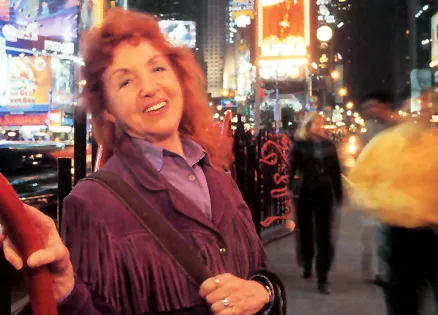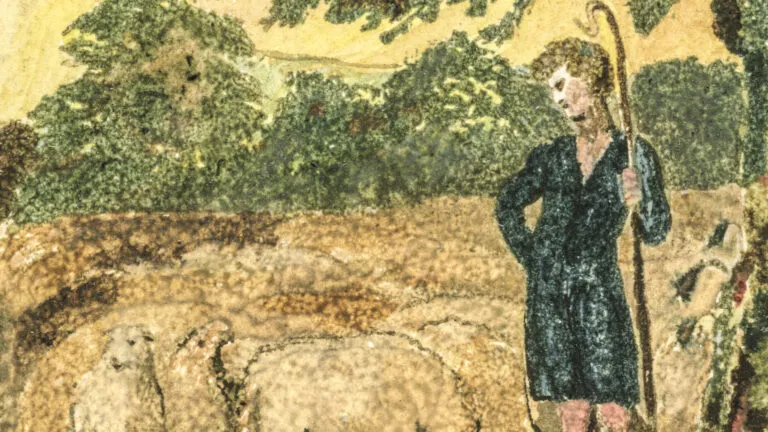Sitting up in my hospital bed, I stared at the night sky, unable to sleep. A few days earlier I’d fallen and fractured my left hip on the sidewalk outside my Manhattan apartment.
But my surgery had been a success, and I was ready to go home. Tomorrow! I thought. I can have my hair done! As a professional entertainer since I was 18, I know the value of looking your best, especially in New York City. A producer might spot you just walking your dog on Broadway!
I glanced at the ugly aluminum walker parked in a corner of the room. “Waiting for me, are you?” I said disdainfully. I’d already taken it for a trial run around the corridors. It made me feel like an old lady. Definitely not my style.
“I’m a performer!” I announced to the stars beyond my window, feeling free to express myself since no one shared my room that night. I wished I could belt a song at the top of my lungs, and blast a few notes on a trumpet as I had when I played Mazeppa in the Broadway show Gypsy with Ethel Merman.
I wanted to throw off my blankets and dance, just like my character Princess Ticklefeather on the Wonderama and Bozo the Clown TV series. Movie roles flashed through my mind, and I could picture myself playing scenes for Woody Allen in Radio Days. It seemed as if he’d directed me only yesterday. He sure won’t cast me if I’m hobbling around with a walker. Were memories all I had left of my career?
Doctors had inserted four pins in my hip to help it heal. Many weeks of rest and recovery were necessary, they’d told me. And I wasn’t a teenager anymore, even though working made me feel like one. My partner, Nino Tello, and I performed everything from pop songs to opera, singing and dancing in clubs and theaters from New York to Las Vegas.
Between engagements we rehearsed and chose new material and costumes. Being an entertainer was more than a living, it was my life. I couldn’t imagine myself doing anything else. I loved performing, giving audiences happiness to take home.
I could still see individual faces lit up: an entire front row in Chicago, a young woman laughing in Poughkeepsie, children in Florida clapping in time with the music. I closed my eyes, trying to shut out that walker in the corner. Will I ever be able to perform again?
There was noise in the hall, and the door opened. “You have company,” said a nurse. She pushed a wheelchair into the room, then helped a patient into the bed next to mine.
The woman was crying and wringing her hands. Her pale face was taut with pain. “Doesn’t speak English, I’m afraid,” the nurse said just before leaving.
The new patient appeared to be in her 70s. She continued to cry, mumbling to herself. I recognized her language was Russian, but I also heard Yiddish words from songs I’d learned when I was a girl. I didn’t know nearly enough to make sense of what she was saying. I wanted to help her, but how?
My roommate had calmed down some the next morning as I waited in a wheelchair for Nino to take me home. When she looked in my direction, I decided to try something.
“Yiddish?” I asked. There was a flicker in her eyes, and she nodded. Then I used words I remembered, telling her she was a shayna madel, which means a nice young girl. She smiled, and nodded again. I figured we were about the same age, so in Yiddish I said, “You’re a nice young girl, and I’m a nice young girl too!”
The woman’s face brightened—one of those I’d always remember, I was sure—and I suddenly recalled a Russian song I’d sung on the radio years ago. I’d learned it by rote, barely understanding the words. But there was an expectant expression on the woman’s face, something I’d seen hundreds of times in the theater. I decided to give it my all.
Sitting up as straight as I could, I brushed back my hair, thrust out my arms and began to sing.
The woman’s eyes sparkled. She started singing along with me. Soon the pain disappeared from her face. We sang together, smiling and clapping in rhythm, louder and louder, till we ended with a spirited “Ya!” Then the woman continued clapping, raising her hands in applause. I bent forward in my chair and took a bow.
Outside I felt embarrassed about what I’d done. Nino helped me struggle with my horrid walker, trying to maneuver me into the front seat of the car without damaging my hip. “I just made a fool of myself,” I told him, explaining how I’d sung for my Russian roommate. “But it seemed to make her feel better.”
“You find an audience wherever you are, don’t you, Doris?” Nino said.
“Very funny,” I said. The sound of the woman’s applause now rang hollow. You really got carried away, I told myself. I’d never perform again. I’d just have to accept it. I settled into the seat and Nino stowed the walker in the trunk. “Look what’s become of me,” I sighed.
“You’re beautiful,” Nino responded with a wink. “And younger than ever.”
“Flatterer,” I muttered, closing my eyes. But as we started on our way I realized I felt strong, filled with energy. I flipped down the sun visor to look in the mirror. I was startled to see fresh color in my face, and a sparkle in my eyes just like the Russian woman’s.
Thinking of her again, I turned to glance at the hospital, and the most amazing vision greeted me floating above the backseat of the car—an astonishing figure, a blond woman in a flowing gown, lovelier than anyone I’d ever seen. Her face emanated warmth, and her arms reached toward me in appreciation and love.
“You’re wonderful,” she seemed to be saying. She made me feel fulfilled, the way I felt after being applauded in the theater. Doris, I realized, you’ve just given a performance! It wasn’t over for me at all. Nino had been right: I’d been onstage, even while recovering in a hospital. I was still an entertainer!
After the first few weeks of physical therapy I got rid of that walker. I tied a ribbon on a cane and was soon strutting around the house. Nino and I are now booking new engagements, and I’m walking down Broadway in style. My lovely vision lasted only a moment, but God had raised the curtain. The show will go on.





